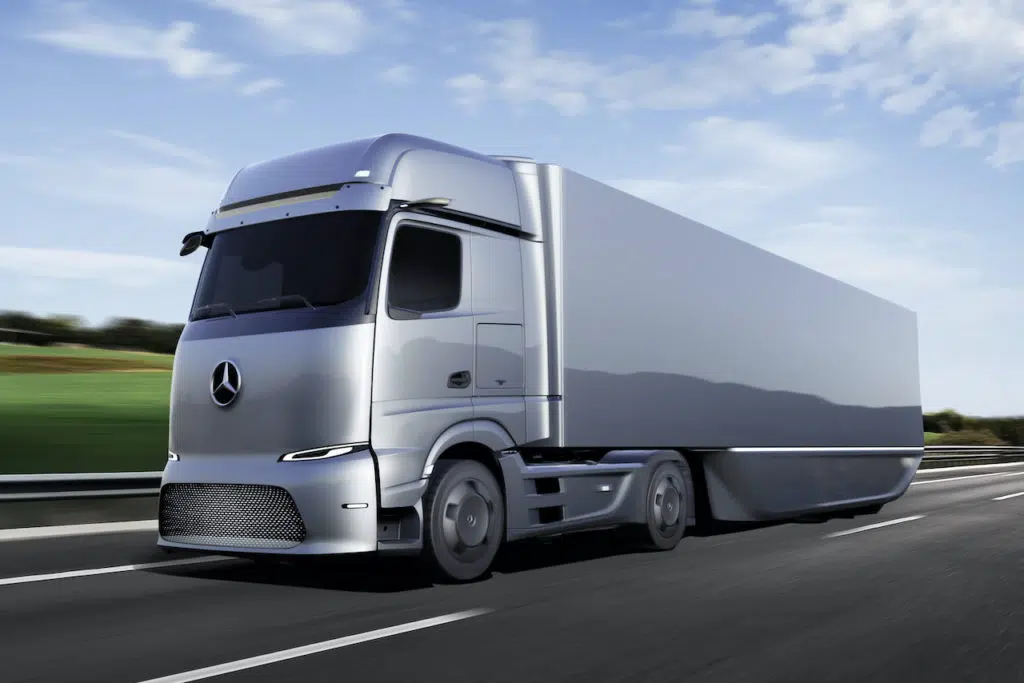Daimler Truck sends the long-distance electric truck eActros LongHaul on the road
Following the market launch of the eActros for heavy distribution transport in 2021, Mercedes-Benz Trucks is consistently pushing ahead with the introduction of further battery-electric models for this and the coming years
. For the important long-haul segment, the eActros LongHaul with a range of around 500 kilometres on a single battery charge should be ready for series production in 2024. The prototypes of the 40-tonne truck are already undergoing tests and this year the developers at Mercedes-Benz Trucks want to test the e-truck on public roads.
The eActros LongHaul is to enable high-performance charging - so-called megawatt charging. Mercedes-Benz Trucks is also preparing additional variants of the eActros - specifically the eActros 300 and eActros 400 - and as early as July the eEconic for municipal use is to roll off the production line at the Wörth plant as the second fully electric series vehicle. Mercedes-Benz Trucks' goal is to increase the share of locally CO2-neutral new vehicles in Europe to more than 50 per cent by 2030.
To further introduce truck customers from all over Europe to electromobility, the manufacturer is organising an event around the Wörth site starting in early June and lasting several weeks. The experts from Mercedes-Benz Trucks will inform a total of around 1,000 participants about the central aspects of e-mobility, from infrastructure and services to electric models. In addition, customers will have the opportunity to drive the eActros 300 on demanding routes and with a realistic payload.
"The great interest in our eActros driving event in Wörth is further proof of the popularity that e-mobility is already receiving from customers. The customers are thus sending a strong signal to all players to now quickly and with combined efforts put more and more electric trucks on the road, expand the charging infrastructure and create cost parity." - Karin Rådström, CEO Mercedes-Benz Trucks
For depot charging, Mercedes-Benz Trucks is working with Siemens Smart Infrastructure, Engie and EVBox Group. In terms of public charging for long-distance transport, Daimler Truck, Traton and Volvo have signed a binding agreement to establish a joint venture. This provides for the development and operation of a public high-performance charging network for battery-electric heavy-duty long-haul trucks and coaches in Europe. The charging network of the three parties is to be available to fleet operators in Europe regardless of brand.
The aim of the project "High-performance charging in long-distance truck transport" (HoLa) with the participation of Daimler Truck and under the patronage of the VDA is to plan, set up and operate a selected high-performance charging infrastructure for battery-electric long-distance truck transport. Two high-performance charging points with the Megawatt Charging System (MCS) are to be set up at each of four locations in Germany and tested in real-life operation. Various other consortium partners from industry and research are involved in the project.
The battery-electric eEconic celebrated its trade fair premiere a few days ago at IFAT, the world's leading trade fair for water, sewage, waste and raw materials management, in Munich. The eEconic scores point with its low noise emissions, especially in urban use in the early morning hours. The electric truck's vehicle architecture benefits from Daimler Truck's global platform strategy: the drive train of the low-floor truck is based on the Mercedes-Benz eActros, which has been in series production at the Wörth plant since October 2021. Since May 2022, FES Frankfurter Entsorgungs- und Service GmbH has already been using a near-series eEconic in Frankfurt am Main for municipal waste collection.
The ultimate goal: CO2-neutral transport on the roads by 2050
Daimler Truck has the ambition to only offer new vehicles in Europe, Japan and North America that is CO2-neutral in driving mode ("tank-to-wheel") by 2039. The two battery-electric models Mercedes-Benz eCitaro and Mercedes-Benz eActros have been rolling off the production line since 2018 and 2021 respectively. The Mercedes-Benz eEconic, the Fuso eCanter and the Freightliner eCascadia will follow later this year, and further locally CO2-neutral vehicles are already being planned. From the second half of the decade onwards, the company also plans to supplement its vehicle range with series-produced vehicles powered by hydrogen-based fuel cells. CO2-neutral transport on the roads by 2050 is the goal.
